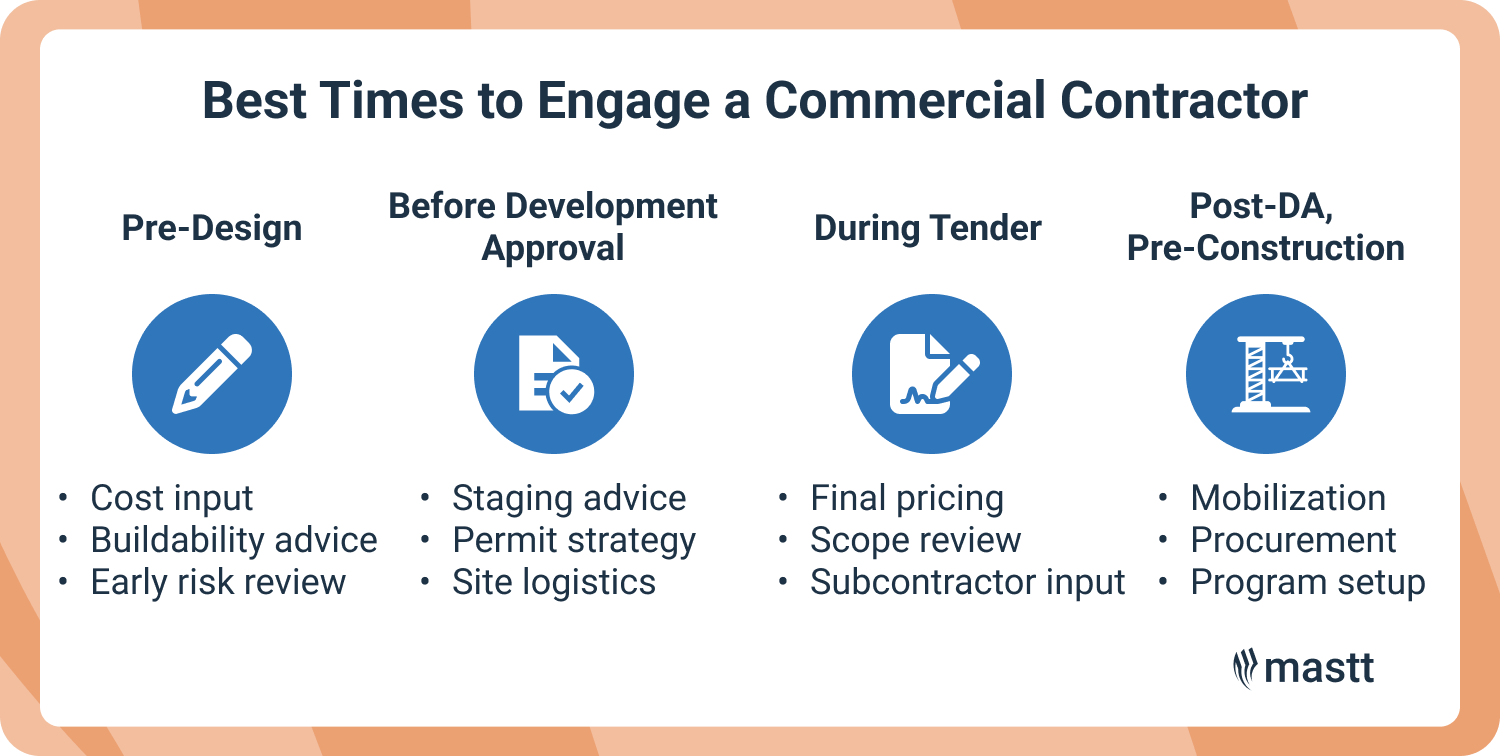If you're running a commercial construction project, you'll need someone to manage the build. A commercial general contractor takes charge of site work, trades, permits, and timelines so your project stays on track.
This guide explains what a commercial contractor does, how they price their services, and how to choose the right one. If you're a project owner or developer, it’ll help you manage cost, reduce risk, and stay in control of your construction project.
What is a Commercial General Contractor?
A commercial general contractor is the person or company responsible for managing a commercial construction project on-site. They coordinate trades, handle permits and inspections, manage the program, and ensure the build meets safety, quality, and contractual requirements.
Commercial contractors don’t do the physical work themselves. Instead, they bring in subcontractors, supervise daily site activities, and ensure everything moves according to the scope and schedule. They also track costs, respond to site issues, and keep the project team aligned, from the owner to the consultants.
In most commercial builds, the general contractor holds the main construction contract. That means they’re legally responsible for delivering the project under the agreed terms, whether it’s a lump sum, cost-plus, or GMP arrangement.
What Types of Projects Do Commercial General Contractors Work On?
Commercial general contractors work on construction projects that serve businesses, institutions, and the government. These include new builds, fit-outs, extensions, upgrades, and major refurbishments.
Here are the most common types of projects commercial contractors deliver:
Some commercial contractors specialize in a single sector, while others deliver services across multiple sectors. Either way, they understand the specific codes, compliance requirements, and delivery risks tied to each project type. That’s why it’s essential to choose a contractor with proven experience in the sector you're building in.
Who Hires a Commercial General Contractor?
Commercial general contractors are typically hired by the organizations responsible for funding and overseeing the delivery of a commercial construction project. These clients often manage large budgets, strict timelines, and compliance obligations. They need a contractor who can coordinate trades, maintain site safety, and deliver to contract.
Here are the primary client types who hire commercial general contractors:
- Private Developers: Hire commercial GCs to deliver office towers, mixed-use sites, and commercial buildings.
- Real Estate Asset Managers: Appoint contractors to maintain portfolio value through new builds or upgrades.
- Institutional Owners: Universities, hospitals, and utility providers contract commercial contractors for capital infrastructure projects.
- Public Sector Bodies: Local councils and government departments often utilize commercial contractors for civic, transportation, and facility projects.
Most hires happen through a structured procurement process, such as a public tender, competitive bid, or negotiated contract. The project delivery methods may vary, but the goal is the same: to find a qualified commercial contractor who can complete the project safely, on time, and within budget.

When Should You Hire a Commercial General Contractor?
You should hire a commercial general contractor as early as possible, ideally before the final designs are finalized. Early engagement helps avoid delays, reduce cost risk, and improve buildability across the project scope.
Many project owners bring in a commercial contractor during the pre-construction phase to assist with estimating, scheduling, and constructability review. Others wait until the design is complete and put the job out to tender.
Both options work, but early contractor involvement gives the contractor time to flag design risks, plan trade sequencing, and align on delivery timelines. The best time to hire depends on your project’s size, complexity, and chosen delivery model.

Difference Between a Commercial and Residential General Contractor
A commercial general contractor manages large-scale, code-heavy builds, while a residential general contractor focuses on homes. Their project scopes, teams, and compliance standards vary significantly based on sector demands.
Use this table to compare commercial vs residential general contractors by project scope, team, and compliance:
If you're delivering a commercial facility, you need a contractor experienced in commercial project management - not one who only works on residential homes. The compliance, coordination, and risk profile are completely different.
What Licenses and Qualifications Do Commercial General Contractors Need?
Commercial general contractors are required to hold valid licenses, insurance, and certifications to operate legally on commercial construction projects. These requirements protect clients and ensure compliance with safety, labor, and building regulations.
Before hiring, project owners and developers should confirm these credentials:
- State or local contractor license: Required in most countries, states, or provinces to confirm the contractor is legally approved to operate.
- Contractor insurance: Must include public liability, workers’ compensation, and builder’s risk coverage for full site and workforce protection.
- Surety bonds: Often required for larger commercial projects to guarantee completion and secure payments to subcontractors.
- Safety certifications: Look for OSHA training (or regional equivalent), a clean safety record, and formal site safety systems.
- Company Financials: Verify the contractor’s financial capacity to support payroll, materials, and ongoing cash flow throughout the build.
- Commercial project experience: Review case studies, completed projects, and client references to confirm relevant experience in similar sectors.
Verifying licenses and credentials shows whether a contractor is truly equipped for commercial-scale delivery. It also reveals if they’re prepared to handle complex site conditions, staffing needs, and compliance reviews.

What are the Pros and Cons of Hiring a Commercial General Contractor?
Hiring a commercial general contractor centralizes project control, but it introduces added costs and reduces design input. This tradeoff affects budget, risk, and the level of involvement you retain.
Use this table to weigh the benefits and drawbacks before engaging a commercial contractor:
A well-matched contractor can improve build outcomes and reduce onsite delays. Always align contract terms with your delivery priorities to ensure a seamless process.
How Much Does a Commercial General Contractor Cost?
Commercial general contractors typically charge a percentage of the total construction cost. Most project owners can expect fees ranging from 10% to 20%, depending on the project's size, complexity, location, and contract structure.
Use this table to understand the cost components included in a commercial contractor’s pricing:
Several factors can influence your final commercial general contractor cost. These variables depend on how your project is set up and where it’s being built.
- The delivery model you choose (e.g., GMP, cost-plus contract, or lump sum) affects how fees are calculated and the level of flexibility built into the contract.
- If the project scope or documents are unclear, contractors will likely include higher allowances or submit change orders later.
- Labor market conditions and subcontractor availability impact pricing, especially in busy or remote regions.
- Timeline pressure, night shifts, or phasing requirements often lead to premium labor and tighter margins.
Fee structures reflect how contractors manage complexity, risk, and delivery, not just markup. Always choose based on clarity and transparency, not just the lowest percentage.
How to Choose the Right Commercial General Contractor
Choosing the right commercial general contractor comes down to qualifications, experience, project fit, and compliance. Don’t rely on price alone. Compare contractors using clear criteria based on your project needs and risk profile.
Here’s what to assess when choosing a commercial contractor:
- Licensing and registration: Confirm they hold valid business, trade, and building licenses in your region.
- Commercial project experience: Check that they’ve delivered similar projects in scale, type, or complexity.
- References and case studies: Ask for completed project examples and client testimonials.
- Safety record and insurance: Review incident history, safety systems, public liability, and workers’ compensation coverage.
- Financial capacity: Make sure they can handle subcontractor payments, materials, and ongoing cash flow.
- Delivery method familiarity: Confirm they understand your contract model, specifically whether it is a lump sum, GMP, or cost-plus.
- Schedule and resource availability: Ensure their team has the capacity to meet your timeline without overstretching.
You can also use a simple evaluation matrix to compare options:
Commercial general contractors are typically selected through a formal procurement process. This might include an open tender, a request for proposal (RFP), or a qualifications-based selection (QBS). Formal tendering is required due to project size, complexity, and public funding or compliance obligations.
Some developers may also negotiate directly with a known contractor based on previous experience. Public institutions often require a structured evaluation process, while private clients may weigh cost, relationships, and past performance more flexibly.
To choose the right commercial general contractor, assess their licenses, track record, financials, and scheduling capacity. A qualified commercial contractor should align with your project’s scope, timeline, and delivery method.
Do Commercial General Contractors Offer Design Services?
Commercial general contractors typically do not provide design services themselves. Their focus is construction delivery, not architectural or engineering design.
Some GCs partner with architects and consultants hired by the owner. Others offer a design-build model where design and construction are bundled into a single contract.
Use this table to understand when and how design services might be included:
If you plan to use your own architect or design team, you’ll need to hire the commercial general contractor separately. Some may support early planning with pre-construction services, such as cost estimating or schedule input. But they won’t lead design unless contracted.
A Good Contractor Makes the Whole Project Easier to Manage
A commercial build can fall behind before construction even begins. Gaps in documents, missed costs, or unclear roles create friction that slows everything down. The right commercial general contractor helps identify issues early, sets clear expectations, and keeps your team aligned and focused.
Commercial contractors are not just there to build - they help manage risk, bring order to moving parts, and give you a more straightforward path from design to handover. When your contractor understands the job, the delivery becomes easier to manage.



















